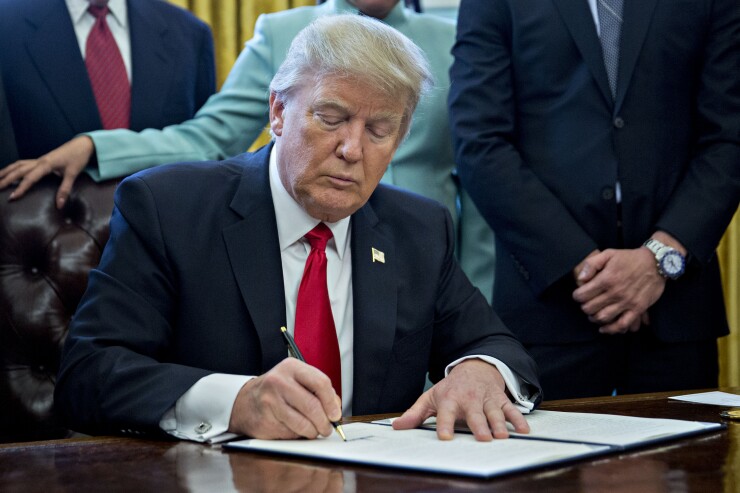A confusing and contentious immigration ban rollout and a leaked executive order draft that targets STEM industries have led U.S. companies to form special crisis committees to handle the disruption to recruiting new workers.
Despite the United States Court of Appeals for the Ninth Circuit's Feb. 9 ruling, which stated that the travel ban makes it more difficult for American firms to compete in the international marketplace, employers are still scrambling to address ongoing foreign work dilemmas.
Companies are pooling their resources from legal, compliance, security, HR, and mobility divisions to create “leadership working groups” to address employee concerns and prepare for expected or impending regulatory changes, according to international law firm Mayer Brown.
“There is no question that this is the time for employers to have their legal departments, their HR departments, their global mobility departments and their compliance departments work together to review whether their compliance programs are up to snuff and sensible in case aggressive action occurs by the administration,” says Liz Stern, a partner with Mayer Brown's Washington, D.C. office.
“That's one of the best protections you can offer to your employees,” she adds.

The immigration ban, which limits travel for foreign nationals of Iran, Iraq, Libya, Somalia, Sudan, Syria and Yemen from entering the United States on any visa category for 90 days, sent employers in a tailspin to
“For U.S. employers who depend on the agility of travel to conduct global business, it created an immediate and escalated need to support your work corps,” says Stern, an expert on U.S. and global immigration and HR and mobility services. “Employers immediately sought guidance on how to address their employees, to offer support and to inform them of whether they should or shouldn’t travel, who was encompassed within the ban, whether having a green card would protect them, whether being a U.S. citizen or dual-national would protect them.”
Companies like
“Employers are definitely concerned about the possibility that some of their workers might be affected by this group of regulations or some future executive order,” says Brian Schaitkin, senior economist in U.S. economic outlook and labor markets at The Conference Board. “Broadly, employers are being very supportive to reach out to them and make sure they understand the new regulations, [and] that they're able to take action to come back into the country if they happen to be outside.”
Questions over new work locations
Going forward, Schaitkin says firms are taking account of their population and what broader restrictions might be placed on their business operations.
The biggest restriction for conglomerates is the inability to send employees on business trips or relocate them to a U.S. location.
See also:
“The uncertainty is huge for business planning,” says Chris Bruce, co-founder and managing director of software company Thomsons Online Benefits. “Whatever planning you’re doing, you want certainty around that location. If you’re looking to move that employee from one location to the other, you want to be certain.”
Even in terms of recruitment, Bruce says that 2.5 times more employees are being recruited by global companies outside the United States than in its borders.
“They don’t want to suggest the employee move unless they can enable that move to take place,” he says. “The concern now is if it’s going to be more difficult.”
New visa dilemmas
With the continuing uncertainty,
The leaked executive order draft seeks to strengthen the integrity of foreign worker visa programs by prioritizing the interests of American workers, which will, in uncertain terms, put H-1B visas at risk.
Highly educated foreign workers can apply for one of 65,000 H-1B visas — the amount Congress approved for FY 2017 — and use their technical expertise in a specialized field.
Should any changes to the H-1B program go into effect, whether that’s a quota cut or the implementation of a merit system, it will particularly affect STEM companies that rely on foreign talent, says Mayer Brown’s Stern.
The Conference Board’s Schaitkin adds that workers from the seven predominantly Muslim countries listed on the travel ban are more highly educated and skilled than the American labor force.
Nearly 50% of H-1B visa holders from Iran, Iraq, Libya, Somalia, Sudan, Syria and Yemen have college degrees; about 5% have doctorates, compared to about 1% of the U.S. labor force as a whole, says Schaitkin.
Prioritizing American workers
The challenge for employers, should Trump sign the executive order, will be demonstrating that they are augmenting their American workforce, rather than replacing it, with foreign talent.
“The idea of H-1B visas is to address the idea of the shortage of higher-skilled workers on a temporary basis,” says Schaitkin. “There's been a desire to perhaps change how the allocation system works to basically give first priority to employers who will pay the most for those visas or will pay workers the most, above what the prevailing wage is.”
Prior to Trump’s leaked executive order, U.S. Rep. Zoe Lofgren (D-Calif.) introduced a bill that makes certain employers are not hiring foreign talent at the expense of Americans, but rather because it is necessary for the position.
Multinational companies’ leadership committees should prepare for a change in policy as politicians try to rein in H-1B visas, regardless if that comes from legislation or an executive order.
“This is a critical time for companies to ensure their visas programs demonstrate top compliance,” says Stern. “It’s simply a part of what companies need to be thinking of now.”





